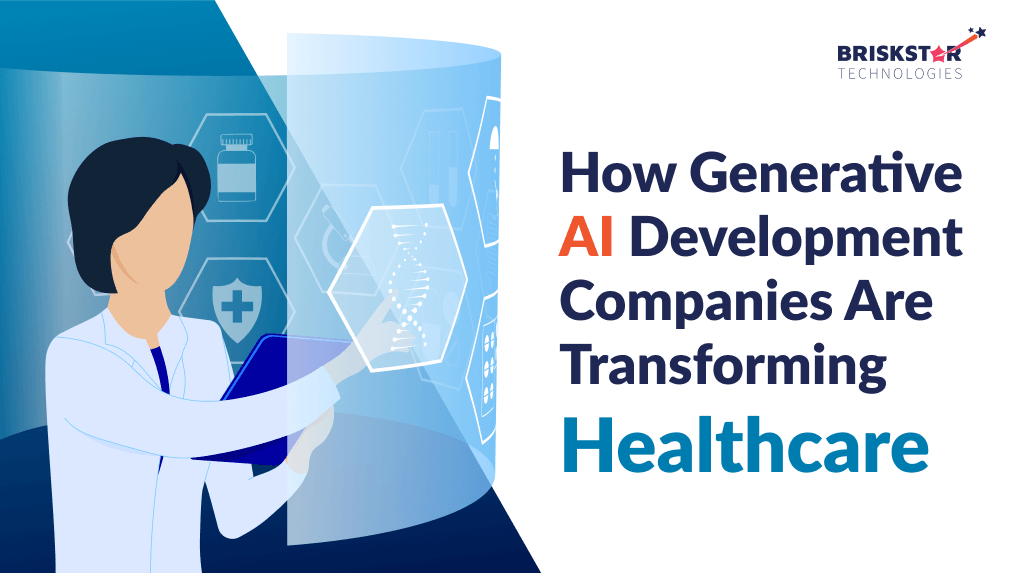The healthcare industry stands at the precipice of a technological revolution, with generative artificial intelligence emerging as one of the most transformative forces reshaping medical practice, research, and patient care. Generative AI development companies are not merely creating tools; they are fundamentally reimagining how healthcare operates, from the smallest clinical interactions to the broadest population health initiatives. This transformation represents a convergence of cutting-edge technology with one of humanity’s most essential needs: effective, accessible, and personalized healthcare.
The Foundation of Healthcare’s AI Revolution
Generative AI differs fundamentally from traditional healthcare software systems. While conventional medical technology typically processes and analyzes existing data, generative AI creates new content, insights, and solutions based on learned patterns from vast datasets. This capability has opened unprecedented possibilities in healthcare, where the complexity of human biology and the variability of patient presentations have historically challenged even the most sophisticated medical professionals.
The journey began with simple pattern recognition systems, but today’s generative AI can produce human-like text, generate medical images, create treatment protocols, and even design new drug compounds. Healthcare institutions worldwide are recognizing that these capabilities address some of their most pressing challenges: physician burnout from administrative tasks, the need for personalized treatment approaches, the complexity of medical research, and the growing demand for accessible healthcare services.
Revolutionizing Medical Documentation and Administrative Tasks
One of the most immediate and impactful applications of generative AI in healthcare involves transforming the burdensome world of medical documentation. Physicians spend approximately 40% of their time on paperwork and administrative tasks, time that could otherwise be devoted to patient care. Generative AI development companies have created sophisticated systems that can listen to patient encounters, understand medical terminology and context, and automatically generate comprehensive medical records, discharge summaries, and treatment notes.
These systems go far beyond simple transcription services. They understand medical context, can identify relevant symptoms and conditions, and organize information in ways that support clinical decision-making. For instance, when a physician discusses a patient’s chest pain during an examination, the AI doesn’t simply record the conversation. Instead, it recognizes the clinical significance of chest pain, automatically categorizes it within appropriate medical frameworks, suggests relevant diagnostic considerations, and formats the information according to established medical documentation standards.
The impact extends beyond individual physician productivity. Healthcare systems using generative AI for documentation report more consistent record-keeping, improved coding accuracy for billing purposes, and better communication between healthcare team members. Nurses can spend more time with patients rather than updating charts, specialists receive more comprehensive referral information, and healthcare administrators gain better insights into patient populations and treatment outcomes.
Transforming Diagnostic Accuracy and Speed
Diagnostic medicine has long been considered as much art as science, requiring physicians to synthesize complex information, recognize patterns, and make critical decisions often under significant time pressure. Generative AI is enhancing this process by serving as an intelligent diagnostic partner that can process vast amounts of medical literature, patient data, and clinical evidence to support more accurate and timely diagnoses.
Modern diagnostic AI systems can analyze symptoms, medical history, laboratory results, and imaging studies simultaneously, generating differential diagnoses ranked by probability and supported by current medical evidence. These systems excel particularly in complex cases where multiple conditions may be present or where symptoms don’t clearly point to a single diagnosis. For example, when evaluating a patient with fatigue, joint pain, and cognitive difficulties, generative AI can consider hundreds of possible conditions, evaluate the likelihood of each based on the specific symptom pattern, and suggest additional tests that would help differentiate between the most likely possibilities.
The technology also addresses diagnostic disparities that can occur due to unconscious bias or limited exposure to certain conditions. AI systems trained on diverse datasets can recognize patterns across different populations, potentially identifying conditions that might be overlooked due to atypical presentations in different demographic groups. This capability is particularly valuable in emergency medicine, where quick and accurate diagnoses can be life-saving.
Read More: AI Chatbot Development Services
Personalizing Treatment Plans and Precision Medicine
Perhaps nowhere is generative AI’s impact more profound than in the development of personalized treatment approaches. Traditional medicine often relies on population-based treatment guidelines, but individual patients can respond very differently to the same interventions based on their genetics, lifestyle, medical history, and other factors. Generative AI development companies are creating systems that can analyze individual patient profiles and generate tailored treatment recommendations that consider these multiple variables.
These systems can process genetic information, previous treatment responses, current medications, lifestyle factors, and social determinants of health to create highly individualized treatment plans. For cancer patients, AI can analyze tumor genetics, patient immune profiles, and treatment histories to suggest optimal chemotherapy regimens or identify patients who might benefit from specific targeted therapies or immunotherapy approaches.
The personalization extends beyond medication selection to include lifestyle recommendations, monitoring protocols, and follow-up care plans. AI systems can generate specific exercise programs for cardiac rehabilitation patients based on their individual fitness levels and risk factors, create customized dietary plans for diabetic patients that consider their food preferences and cultural background, or develop personalized mental health interventions that align with individual coping styles and therapeutic preferences.
Advancing Drug Discovery and Development
The pharmaceutical industry has embraced generative AI as a powerful tool for accelerating drug discovery and development, processes that traditionally take over a decade and cost billions of dollars. AI systems can now generate novel molecular structures, predict their properties, and identify promising drug candidates much more rapidly than conventional approaches.
Generative AI can design molecules with specific desired properties, such as the ability to bind to particular protein targets while avoiding unwanted side effects. These systems can explore vast chemical spaces that would be impossible for human researchers to investigate systematically, identifying novel compounds that might never have been discovered through traditional approaches.
The technology also accelerates the optimization of existing drugs. AI can predict how modifications to a drug’s structure might improve its effectiveness, reduce side effects, or enhance its delivery to specific tissues. This capability has proven particularly valuable in developing treatments for rare diseases, where traditional market incentives may not support extensive research and development efforts.
Clinical trial design represents another area where generative AI is making significant contributions. AI systems can analyze previous trial data to identify optimal patient populations, predict enrollment challenges, and suggest trial designs that are more likely to succeed. They can also generate synthetic patient data to supplement clinical trials, potentially reducing the time and cost required to bring new treatments to market.
Enhancing Medical Education and Training
Medical education is experiencing a renaissance through generative AI technologies that can create personalized learning experiences, generate realistic patient scenarios, and provide immediate feedback to students and residents. These systems can create unlimited variations of clinical cases, allowing medical students to practice diagnosis and treatment planning across a much broader range of scenarios than traditional case-based learning permits.
AI-powered simulation systems can generate realistic patient encounters that adapt based on the learner’s decisions, creating branching scenarios that demonstrate the consequences of different clinical choices. Students can practice difficult conversations with patients, learn to manage complex medical emergencies, and develop clinical reasoning skills in a safe environment where mistakes become learning opportunities rather than patient safety risks.
The technology also supports continuing medical education for practicing physicians. AI systems can identify knowledge gaps based on a physician’s practice patterns and generate personalized learning content to address these areas. They can create case studies based on the latest medical research, helping physicians stay current with rapidly evolving medical knowledge and best practices.
Improving Patient Engagement and Communication
Patient engagement has long been recognized as crucial for optimal health outcomes, but busy healthcare systems often struggle to provide the personalized attention and communication that patients need. Generative AI is bridging this gap by creating systems that can provide patients with personalized health information, answer questions, and support self-management of chronic conditions.
AI-powered chatbots and virtual assistants can provide patients with immediate access to health information, helping them understand their conditions, medications, and treatment plans. These systems can communicate in multiple languages, adapt their communication style to different health literacy levels, and provide information in formats that accommodate various learning preferences.
For patients with chronic conditions like diabetes or heart disease, AI systems can generate personalized educational content, remind patients about medications and appointments, and provide ongoing support for lifestyle modifications. These systems can analyze patient-reported symptoms and behaviors to identify concerning trends and alert healthcare providers when intervention might be needed.
The technology also supports shared decision-making by helping patients understand their treatment options. AI systems can generate personalized risk assessments, explain the potential benefits and risks of different treatments in language the patient can understand, and help patients weigh their options based on their individual values and preferences.
Read More: AI-Powered Marketing
Streamlining Healthcare Operations and Resource Management
Healthcare systems face constant pressure to improve efficiency while maintaining quality care. Generative AI is helping address these challenges by optimizing various operational aspects of healthcare delivery, from scheduling and resource allocation to supply chain management and predictive maintenance.
AI systems can analyze historical data, seasonal patterns, and local factors to predict patient demand and optimize staffing schedules. They can identify bottlenecks in patient flow and suggest operational changes to improve efficiency. For example, AI might analyze emergency department data to predict busy periods and recommend optimal staffing levels, or identify patterns in surgical case durations to improve operating room scheduling.
Supply chain optimization represents another significant application. AI systems can predict demand for medical supplies, medications, and equipment, helping healthcare systems maintain appropriate inventory levels while minimizing waste from expired products. During the COVID-19 pandemic, these capabilities proved invaluable as healthcare systems struggled to maintain adequate supplies of personal protective equipment and other essential items.
Predictive maintenance powered by AI helps healthcare systems maintain critical equipment more effectively. AI systems can analyze equipment performance data to predict when maintenance will be needed, preventing unexpected failures that could disrupt patient care and proving more cost-effective than reactive maintenance approaches.
Revolutionizing Medical Imaging and Radiology
Medical imaging has been one of the most successful early applications of AI in healthcare, and generative AI is taking these capabilities to new levels. Beyond simply analyzing existing images, generative AI can create synthetic medical images for training purposes, enhance image quality, and even generate images that highlight specific pathological features.
AI systems can now generate high-quality medical images that are indistinguishable from real images, providing valuable training data for medical students and residents. This capability is particularly important for rare conditions where few real examples may be available for educational purposes. AI can also generate images showing the progression of diseases, helping physicians and patients understand how conditions might evolve over time.
Image enhancement represents another significant application. AI systems can improve the quality of images taken with older equipment or in suboptimal conditions, potentially extending the useful life of existing imaging equipment and improving diagnostic accuracy in resource-limited settings. They can also generate images at higher resolutions or with better contrast, helping radiologists identify subtle abnormalities that might be missed in lower-quality images.
The technology also supports the development of new imaging techniques. AI can predict what images would look like using different imaging modalities, potentially reducing the number of different scans patients need to undergo while still providing comprehensive diagnostic information.
Addressing Healthcare Disparities and Accessibility
One of the most promising aspects of generative AI in healthcare is its potential to address long-standing disparities in healthcare access and quality. AI systems can provide high-quality medical expertise to underserved areas where specialist physicians may not be available, and they can help overcome language barriers that prevent effective communication between patients and providers.
Telemedicine platforms enhanced with generative AI can provide remote consultations that rival in-person visits in quality and effectiveness. AI systems can analyze patient-reported symptoms, review uploaded images or videos, and provide diagnostic guidance to local healthcare providers. This capability is particularly valuable in rural areas, developing countries, and other settings where access to specialist care is limited.
Language translation represents another significant application. AI systems can provide real-time translation services that go beyond simple word-for-word translation to include medical context and cultural considerations. These systems can help ensure that non-English-speaking patients receive the same quality of care as English speakers, and they can help healthcare providers better understand cultural factors that might influence treatment decisions.
The technology also supports the development of healthcare solutions specifically designed for resource-limited settings. AI systems can be trained to work with limited diagnostic information, provide treatment recommendations based on available medications and resources, and help local healthcare workers manage complex conditions with minimal specialist support.
Transforming Mental Health Care
Mental health care is experiencing a particular transformation through generative AI technologies that can provide personalized therapeutic interventions, monitor patient well-being, and support mental health professionals in their practice. AI systems can generate personalized cognitive behavioral therapy exercises, create meditation and mindfulness programs tailored to individual needs, and provide ongoing support for patients managing depression, anxiety, and other mental health conditions.
These systems can analyze patterns in patient communication, sleep, activity levels, and other behavioral indicators to identify early signs of mental health crises and alert healthcare providers when intervention might be needed. They can also provide immediate support during crisis situations, offering coping strategies and connecting patients with appropriate resources.
For mental health professionals, AI systems can generate treatment plans based on evidence-based practices, track patient progress over time, and suggest modifications to therapeutic approaches based on patient responses. They can also provide supervision and training support for new therapists, helping ensure consistent quality of care across different providers and settings.
Advancing Population Health and Epidemiology
Public health officials and epidemiologists are leveraging generative AI to better understand disease patterns, predict outbreaks, and develop more effective prevention strategies. AI systems can analyze vast amounts of health data to identify emerging health threats, model the spread of infectious diseases, and generate recommendations for public health interventions.
During the COVID-19 pandemic, AI systems proved invaluable for tracking disease spread, predicting hospital capacity needs, and optimizing vaccine distribution strategies. These experiences have led to the development of more sophisticated systems that can provide real-time analysis of population health trends and support rapid response to emerging health threats.
AI systems can also generate personalized prevention recommendations for entire populations, taking into account local risk factors, demographic characteristics, and available resources. They can identify high-risk individuals who might benefit from targeted screening or prevention programs and help public health officials optimize resource allocation to maximize population health benefits.
Challenges and Considerations in Implementation
While the potential benefits of generative AI in healthcare are enormous, implementation comes with significant challenges that must be carefully addressed. Data privacy and security concerns are paramount, as healthcare AI systems require access to sensitive patient information to function effectively. Healthcare organizations must implement robust security measures and ensure compliance with regulations like HIPAA while still enabling AI systems to access the data they need.
Regulatory approval represents another significant challenge. Healthcare AI systems must undergo rigorous testing to demonstrate safety and effectiveness before they can be deployed in clinical settings. The regulatory landscape for AI in healthcare is still evolving, and companies must navigate complex approval processes while ensuring their products meet the highest standards for patient safety.
Integration with existing healthcare systems poses technical and organizational challenges. Many healthcare organizations use legacy computer systems that weren’t designed to work with modern AI technologies. Implementing generative AI often requires significant upgrades to existing infrastructure and changes to established workflows and processes.
Healthcare professionals must also be trained to work effectively with AI systems. This includes understanding the capabilities and limitations of AI, knowing how to interpret AI-generated recommendations, and maintaining the critical thinking skills necessary to provide safe and effective patient care. The goal is not to replace healthcare professionals but to augment their capabilities and allow them to focus on the aspects of care that require human judgment, empathy, and expertise.
Read More: Designing the Future: The Rise of AI in User Experience
The Economic Impact and Return on Investment
The economic implications of generative AI in healthcare extend far beyond the initial costs of implementing these technologies. Healthcare systems that successfully integrate AI report significant improvements in efficiency, quality, and patient satisfaction that translate into substantial financial benefits.
Reduced administrative burden alone can generate significant savings. When physicians spend less time on documentation and other administrative tasks, they can see more patients or spend more quality time with each patient. This improvement in productivity can help address physician shortages while improving patient care quality.
Improved diagnostic accuracy and personalized treatment approaches can reduce healthcare costs by avoiding unnecessary tests, preventing complications, and ensuring patients receive the most effective treatments. AI systems that identify high-risk patients before they develop serious complications can prevent costly hospitalizations and emergency department visits.
The technology also supports value-based care models by providing better data and analytics to track patient outcomes and identify opportunities for improvement. Healthcare systems can use AI-generated insights to develop more effective care management programs and demonstrate improved outcomes to payers and regulatory agencies.
Looking Toward the Future
The future of generative AI in healthcare promises even more transformative applications as the technology continues to evolve. Researchers are developing AI systems that can understand and generate not just text and images but also molecular structures, genetic sequences, and complex biological processes. These advances could lead to breakthroughs in our understanding of disease mechanisms and the development of entirely new categories of treatments.
The integration of AI with other emerging technologies like genomic sequencing, wearable devices, and Internet of Things sensors will create comprehensive health monitoring and management systems that can provide continuous, personalized care. Patients may have AI assistants that monitor their health in real-time, predict and prevent health problems before they occur, and coordinate care across multiple providers and specialties.
As AI systems become more sophisticated, they may also take on more complex clinical tasks. Future AI might be able to perform certain types of surgery, conduct initial patient evaluations, or even serve as primary care providers for routine health maintenance and common conditions. However, these developments will require careful consideration of ethical, legal, and safety implications.
The democratization of healthcare through AI represents perhaps the most significant long-term opportunity. As AI systems become more capable and less expensive to deploy, high-quality healthcare expertise could become available to people regardless of their geographic location or economic circumstances. This could help address global health disparities and make quality healthcare a reality for billions of people who currently lack access to adequate medical care.
Conclusion
Generative AI development companies are not simply creating new tools for healthcare; they are fundamentally transforming how healthcare is delivered, experienced, and conceptualized. From streamlining administrative tasks and improving diagnostic accuracy to personalizing treatments and making healthcare more accessible, AI is addressing many of the most pressing challenges facing modern healthcare systems.
The transformation is still in its early stages, but the impact is already profound and will only accelerate as the technology continues to mature. Healthcare professionals, patients, and society as a whole are beginning to experience the benefits of AI-enhanced healthcare, from more accurate diagnoses and personalized treatments to improved access and reduced costs.
Success in this transformation requires more than just technological advancement. It demands thoughtful integration of AI into healthcare workflows, careful attention to ethical and safety considerations, and ongoing collaboration between technology developers, healthcare professionals, regulators, and patients. The companies and healthcare systems that navigate these challenges successfully will be positioned to deliver better, more accessible, and more personalized healthcare than has ever been possible before.
As we look toward the future, it’s clear that generative AI will play an increasingly central role in healthcare delivery. The question is not whether AI will transform healthcare, but how quickly and effectively we can realize its potential while ensuring that the benefits are distributed equitably and that the technology serves to enhance rather than replace the human elements of care that patients value most. The journey toward AI-enhanced healthcare has begun, and its ultimate destination promises to be a healthcare system that is more effective, more accessible, and more responsive to individual patient needs than anything we have known before.
![circle-shapes]()











